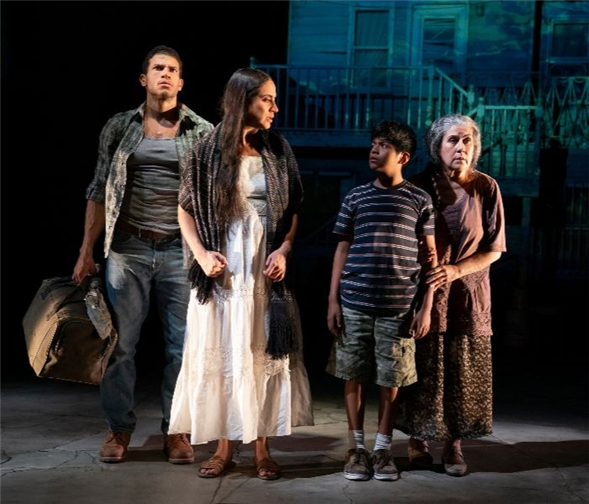Translate Page

Sabina Zúñiga Varela on starring in Mojada at The Public Theater
---
When people ask Sabina Zúñiga Varela, "What are you?," she never says Hispanic. She despises that the term recalls the violent legacy of the Spanish conquistadors. Instead the actress responds, "I'm New Mexican," which she feels better encompasses her diverse Mexican/Spanish/Irish/Native American heritage.
Zúñiga Varela's complex Latinidad identity informs her portrayal of the protagonist in Mojada, playwright Luis Alfaro's reimagining of Medea. Set in modern-day Corona, Queens in a Latin American immigrant community, this timely bilingual take on Euripides' tragedy chronicles the struggles of a young Mexican mother, who recently crossed the border with her husband to try to give their son a better life. Unfortunately, she's met with adversity and exploitation, which are ultimately her family's undoing.
If you believe in the ancient Greek notion of fate, Zúñiga Varela and Alfaro were meant to work together. They first met when Zúñiga Varela was a young woman at a MacArthur Fellows reunion, since both Alfaro and the actress' mother were recipients of those "Genius Grants." A few years later, Zúñiga Varela had Alfaro as a professor as she earned her MFA in acting at the University of Southern California. After graduation, Alfaro cast her in an early iteration of Mojada in 2012 titled Bruja, which earned her an Equity card.
"And now she's done all my Greeks," says Alfaro, who's also adapted Oedipus (Oedipus El Rey) and Electra (Electricidad) through a Latinx lens. Mojada, currently running at The Public Theater, is the fourth iteration of the play, all starring Zúñiga Varela. The playwright and his muse not only share a similar ethnic background and a passion for activism, but they also approach theatre-making in similar ways. "I love writing for her voice," Alfaro says.
Over the past seven years, their collaboration has fostered experimentation as Alfaro reinvented Mojada multiple times. As Bruja it was set in Chicago, where it was performed. The last two incarnations, which played in L.A., were subtitled "A Medea in Los Angeles." Bringing the show to New York inspired him to change the locale again, and the drama thrives in this cultural melting pot. The pan dulce vendor in L.A. is now a NYC churro lady, and the sounds of the subway rumble in the distance.
Alfaro is an obsessive rewriter. Like the main character, who's a seamstress, he adds, removes and adjusts material in order to find the right cut. At one point he wrote an out-there scene he calls his "Sam Shepard moment," but after rehearsing it with Zúñiga Varela he realized it didn't fit. Yet he appreciates that she gave it a try. "As an artist, she understands that she needs to play the scene in order to get where I was going," he says. "It's great to work with an actor who doesn't fall apart on you."
At a time when Latinx immigrants are being demonized by the U.S. government, Mojada feels especially urgent. Using Medea, which Alfaro cites as perhaps the first immigrant story told on stage, as a template, Mojada thoughtfully explores the challenges of living as an undocumented person in a country built on greed and the patriarchy.
"It's a wake-up call, like a slap to the face," says Zúñiga Varela. "It shows how amazing the Greeks were and, sadly, that humans still have these really bad habits. It shows what we do to each other when power takes over."
Even the title is meant to inflame as mojada, which literally means wet, is shorthand for a terrible slur against Latinx immigrants. "We're using a word people use to dehumanize others," says Zúñiga Varela. "We've reclaimed it and are bringing it into The Public, literally."
While Zúñiga Varela appreciates being able to play characters that showcase her heritage, she doesn't want to be ghettoized. "I love being in roles where I'm not representing myself as a Latina for the sake of some show saying it's diverse," she says. "I want to do Ibsen, Shaw, Chekhov, all the dead white guys, and I want to do Zacarías and Alfaro because their language is just as poetic. I want to do the leading ladies who have gravitas, who are living situations they want to change."
---
Jose Solís is a NY-based writer and editor who's been covering theatre and film professionally since 2003. He is a member of the Drama Desk. Follow him at @josesolismayen. Follow TDF at @TDFNYC.
Top image: Alex Hernandez, Sabina Zúñiga Varela, Benjamin Luis McCracken and Socorro Santiago in Mojada. Photos by Joan Marcus.
TDF Members: Go here to browse our latest discounts for theatre, dance and concerts.